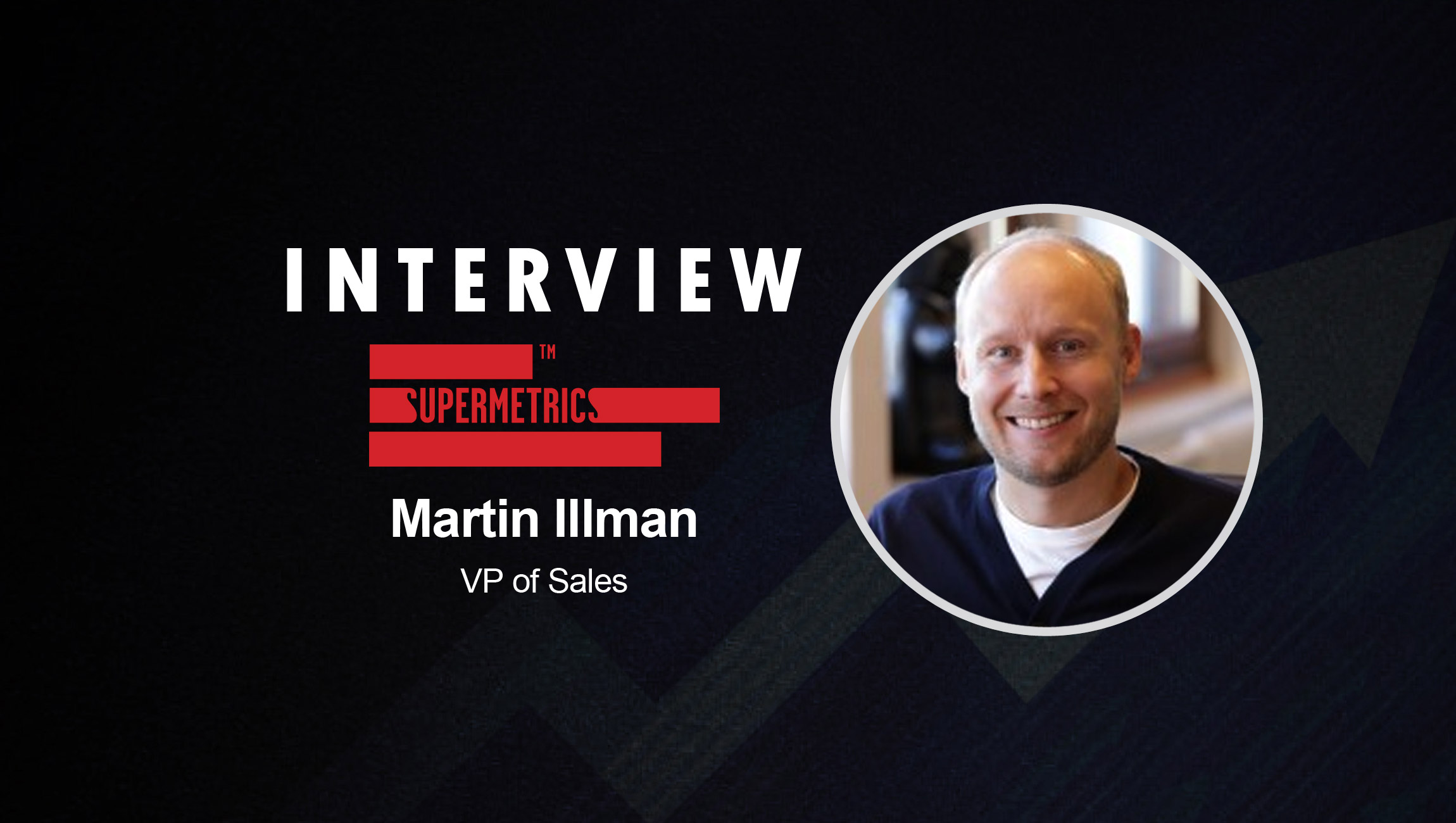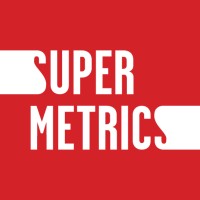In this interview, Martin Illman, VP of Sales at Supermetrics joins SalesTechStar to talk about the different ways in which the B2B and tech marketplace in Finland responded to the challenges of 2020 amid the global Covid-19 pandemic while also highlighting a few of the top evolving consumer buying and shopping trends this year. Catch the complete conversation:
______
Tell us a little about yourself Martin, we’d love to hear about the Supermetrics platform and how its evolved over the years. What are some of the near-future product innovations being planned?
I lead sales here at Supermetrics. I’m based in Helsinki where we have our headquarters and where we run our global sales operations from.
I started my sales career at Meltwater, where I spent ten years learning the ropes of selling a SaaS solution in an international environment. Over the years I went from a sales consultant to a Managing Director role at Meltwater’s San Francisco headquarters. After ten years, I felt like I knew the company inside out. It was time to see if I could use the skills I had acquired and start something new.
That is when I got to know the guys at Supermetrics. Supermetrics is a fast growing SaaS company with some half a million users to its products in over 120 countries today. We are currently at an ARR of roughly 20 million and have just over 100 employees in Helsinki, Atlanta and Vilnius.
Our platform makes it easy to automate data transfers from 70+ marketing data sources to tools like Google Sheets, Google Data Studio, Excel, data warehouses and various BI-tools. It is used by marketers and marketing agencies looking to consolidate scattered data to one place for analysis, reporting and storage.
When I joined back in May 2018, I was the first sales hire, and there were maybe 30 people in the company overall. The product was strong and I knew how to sell a SaaS product to an international market. It was a good match and a great platform to start building a sales channel on. Today we have a sales team of 40 people based in Helsinki, Finland, and Atlanta, USA. We started from inbound sales, and as we grew, we added expansion and outbound sales into the mix.
On our near-future product innovations: Supermetrics has always built products that are easy to use. Anyone can crunch data at scale in tools like Google Sheets using Supermetrics, and most of our products don’t require technical skills to set up and use. In that sense, we have democratized data for marketers. What we’ve seen a lot in the last couple of years is that more and more businesses are reaching a stage where the amount of data they work with becomes a challenge. Processes become slow and tools run out of capacity. Adding a data warehouse into the mix would solve many problems, but data warehouses have traditionally been seen as something engineers only operate. So we decided to change that. Last year, we brought our first data warehouse product, Supermetrics for BigQuery, to the market, and have just launched our second DWH product, Supermetrics for Snowflake. Now, setting up a marketing data warehouse is easy for non-engineers as well, and we are seeing some super exciting success stories among our customers who have adopted a data warehouse into their martech stack. We will have strong emphasis on expanding this offering and educating people on this opportunity going forward.
Read More: SalesTechStar Interview with Kevin Baumgart, VP of Sales at Hologram
How have you seen the global tech marketplace respond to the Covid-19 pandemic, could you comment on some of biggest initiatives companies in Finland undertook during this time to help support their teams during this time?
It is obvious that inside sales teams have taken less of a hit than field sales, which was pretty much wiped out entirely. Overall Covid-19 has forced businesses to really focus on selling remotely and to optimize that process. Focusing efforts on the areas less affected by the pandemic has helped us. One of the things we had to revamp was our onboarding for new hires. In the beginning of the year we were 13 people and now we are 40. We had to go from a 2 week class-room -type of onboarding program to a fully remote online onboarding process overnight really.
In general the transition to fully digital remote-working model in companies and schools in Finland happened almost overnight in March, and Finnish organizations demonstrated nimble and practical approach in combination with already good existing infrastructure (eg internet connectivity) to making people successful while working remotely.
Specific initiatives that come to mind from Finland, are delivery services: the logistic companies were forced to take a big leap in digitalization, and are now in a much better place in terms of customer centricity and user experience, than they were before the pandemic. The food retailers in Finland have been slow in moving online and offering deliveries, so Wolt, a restaurant food delivery company, expanded to delivering groceries. Big events like Slush & Nordic Business Forum had to turn their offline experiences to online platforms, and have done a pretty good job with it!
How have you seen eCommerce tech providers adjust their offerings to meet changing user needs this year; what are some of the top innovations you’ve seen stand out the last few months?
One of the most useful “innovations” for us that Covid and remote working has fast-tracked, was transitioning completely to electronic signatures of our customer contracts via DocuSign. While not a new invention, this has allowed our sales team to continue getting deals done while increasing efficiency.
As buying models, delivery models and shopping models change in the light of Covid-19 globally, what tips do you have for marketing and sales teams across industries to adapt faster to new models?
For a SaaS company like Supermetrics, the adjustment is far less drastic than it is for some other businesses. We are used to selling remotely and have always used online channels and tools for meetings, communications and tracking our performance. In our case, there has been very little change, if any, in buying models as well. The buying cycle has remained the same and there are hardly any delays in deals coming through. However, many larger deals do require C-level approval now. So the approval rounds may take a little more time than before the pandemic.
How will the global B2B and Tech marketplace start to transform with the effects of the pandemic; what are some newer capabilities and standards that will start to take centerstage in the near-future?
The pandemic has definitely underlined the importance of user experience. Now more than ever, people are willing to pay more for products that are easy and nice to use. Budgets may have been cut, but at the same time, businesses are overspending on digital channels, and are doubling down on data to optimize their spend. We are fortunate at Supermetrics, because we happen to help businesses with these particular areas, thus have not suffered a big hit business-wise.
In general, I see that the agile and data-driven businesses are most likely to pull through. And those who know their customers well. If your resources and budgets are all tied into some big grand plan you may be in trouble now. Now more than ever it is about being agile: pilot, measure, and adjust. Be quick to react to your customers changing needs and use your data. If you know your customers thoroughly, you will make better business decisions. For example, we made Shopify data available for our customers when Covid-19 caused a surge in e-commerce growth.
Can you talk about your martech / salestech stack and how you optimize it to meet your business goals?
Two years ago we didn’t even have a CRM, so we have come a long way. Our tech-stack now includes products like Slack, Exponea, Salesforce, Salesloft, Aircall, DocuSign, Calendly, Gotomeeting, SalesNavigator, BigQuery and Looker. Being a data company we really practice what we preach and basically use data everywhere. We are also able to use our own Salesforce connector, for example, to pull data from Salesforce, and analyse and report it in our own tools. When the pandemic hit, we did not need to add many new tools into the mix, but we did have to pay attention to the bandwidth of the existing stack to make sure it can handle the growing volume.
We’d love to hear about your most memorable marketing / sales moment or biggest sales/leadership takeaway as a parting thought!
When times are hard, teams are put to test. And I am immensely happy to see that the team we have built ourselves here at Supermetrics is a solid one. During the pandemic, we have grown from 13 to 40 people in the team, onboarded most new members entirely online, and worked remotely for months. Inspite of this, we have had record sales even in April and May last spring. I am sure every sales leader has had moments of worry when they had to adjust to their teams working remotely. Will everyone deliver even when you are not there to oversee it? For me, this year has shown that we have managed to build a wonderful, accountable team that thrives together. Realizing this has been a truly meaningful moment for me.
From the early days I remember myself and two colleagues wondering how we could handle all the leads flooding in: we’d need at least 30 people to handle them, we thought. Realizing the huge potential we were sitting on was exciting. The people who had been there before us seemed to think that it was normal to have leads flooding in like that. We were like, it is not normal! =)
How do you Reformulate Sales and Marketing Strategies for the New Normal? Catch these tips where leaders from Xactly, Upland Software and CloudShare share their thoughts!
Martin Illman is the VP of Sales at Supermetrics






















